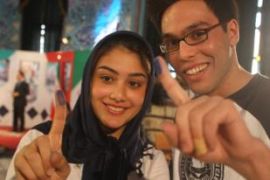Polls close in Iranian run-off vote
Poll said to be crucial for Ahmadinejad who will face presidential race in 2009.

His supporters took 90 of the 132 conservative seats in the first round on March 14.
Reformists won 31 seats and independents won 39 seats.
Parliament does not determine policy in areas such as Iran’s disputed nuclear programme, oil or foreign affairs. It does, however, have an influence on economic policy.
More voting time
Officials added an additional two hours of voting time before polls closed on Friday, allowing citizens like Hassan Alikhani, 39, to make it to the polls in Tehran, the capital, after work.
“Fortunately they extended the voting time, and I voted for Ahmadinejad’s supporters to facilitate him bringing justice to the people,” Alikhani said.
Ahmadinejad came to power in 2005 on a populist platform to bring the country’s oil wealth to average Iranians.
But with inflation running at 17.8 per cent annually, his management of the economy has been an issue in the election.
Reformists hoped to capitalise on this discontent, but the cleric-run Guardian Council disqualified about 1,700 reformist candidates ahead of the first round of voting, accusing them of insufficient loyalty to Islam and the 1979 revolution.
Re-election
|
“The same feeling that motivated us to accomplish our duty in the first round is motivating us to vote today” Ayatollah Khamenei, Iran’s supreme leader |
Reformists, who call for reducing clerical powers and support greater economic and social tolerance, could only run in about half the races around the country.
Ahmadinejad faces a re-election battle in the summer of 2009 against a background of discontent over high inflation, and his toughest competition is expected to come from more moderate fellow conservatives.
As in the first round, the authorities have been emphasising the importance of a strong turnout as a demonstration of support for Iran’s Islamic system and defiance towards the West.
“The same feeling that motivated us to accomplish our duty in the first round is motivating us to vote today,” said Ayatollah Ali Khamenei, the supreme ruler, as he voted in Tehran.
Low turnout
Officials said turnout appeared to be lower than in the first round – when participation was more than 60 per cent – but insisted that this was normal in run-offs.
“The level of participation is relatively good. But usually participation is lower in the second round,” said Mostafa Pour Mohammadi, the interior minister.
The first results from the provinces were expected on Saturday with those from Tehran a day later.
The West reacted with suspicion after the conservative victory in the first round, which the United States called “cooked”.